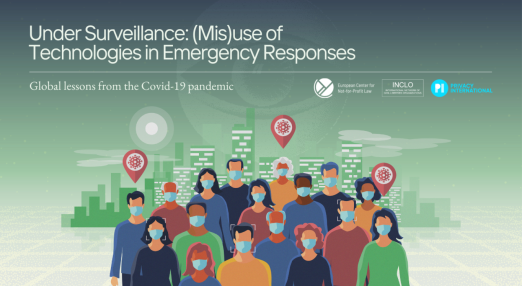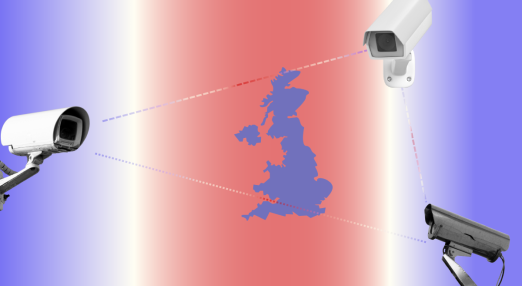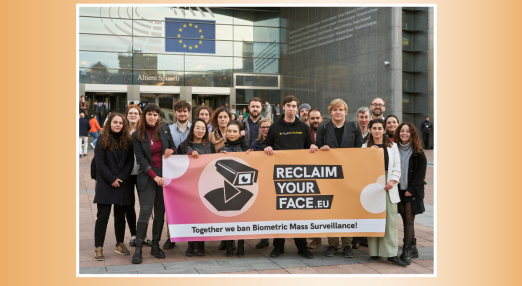Privacy and data protection
Privacy and data protection are essential for us to live, connect, work, create, organise and more. Governments and companies have long used mass surveillance for control trying to legitimise snooping for health, security or other reasons. The near-total digitisation of our lives has made it easier to control, profile and profit from our attention, data, bodies and behaviours in ways that are very difficult for us to understand and challenge. European data protection standards such as the GDPR are a good step forward but we need more to effectively ensure enforcement and protection against unlawful surveillance practices.
Filter resources
-

The UK will treat online images of immigrants crossing the Channel as a criminal offence
On 17 January, the United Kingdom (UK) government announced that online platforms will have to proactively remove images of immigrants crossing the Channel in small boats under a new amendment to be tabled to the Online Safety Bill. The announcement, intended to bolster the UK’s hostile immigration policy, has been met with concern among the British public and charities working with people on the move.
Read more
-

Under surveillance: (mis)use of technologies in emergency responses
In the months following the beginning of the COVID-19 pandemic, more than half the world’s countries enacted emergency measures. Within this broader context, we have seen a rapid scaling up of governments’ use of technologies to enable widespread surveillance. How has this impacted civil society groups globally?
Read more
-

Looking back at 2022: Protecting and advancing digital rights in times of crisis
In moments where we should be urgently tackling the climate crisis and working towards peace and justice worldwide, state funds and efforts seem to reinforce militarisation, fuel the climate crises and injustice. In response to increased surveillance and control practices coming from governments and private companies, EDRi members and partners have put forward a vision in which people live with dignity and vitality. What have we collectively achieved in 2022?
Read more
-

What are the provisions of new policing draft laws
The SHARE Foundation has consistently advocated against the legalisation of mass, indiscriminate biometric surveillance for the past four years, particularly during the consultation process launched upon the withdrawal of the first Draft Law on Internal Affairs. A new draft with old fundamental issues is now before us. The public hearing is open until the end of December.
Read more
-

EU watchdog finds European Commission failed to protect human rights from its surveillance aid to African countries
The European Ombudsman has found that the European Commission failed to take necessary measures to ensure the protection of human rights in the transfers of technology with potential surveillance capacity supported by its multi-billion Emergency Trust Fund for Africa.
Read more
-

Update: UK’s Online Safety Bill heralds a trio of surveillance
The UK’s Online Safety Bill was back in the Westminster Parliament in December It had been stalled for five months whilst the new British government made a few changes. A Parliamentary debate on Monday (5 December 2022) revealed the shift in policy direction for the first time. It’s a relatively small change with big implications. Read more about the changes.
Read more
-

Legal challenge: The Serbian government attempts to digitise social security system
Organisations from across the world submit a joint legal opinion to support a Serbian NGO’s legal challenge to the Social Card law due to concerns over the right to privacy, the right to social security, and data protection.
Read more
-

Back to the Future: Activism, the copyright Directive and lessons for the present
The Copyright Directive marked a key moment in internet history. Civil society, and EDRi in particular, have reflected on the role we played in the political debate and what would that mean for future digital policy fights. In this blogpost, we look back to assess the success of the strategies we adopted and what are the takeaways we should keep in mind when challenging current human rights threats like chat control and facial recognition.
Read more
-

EDRi-gram, 14 December 2022
192 organisations and individuals call on the EU to better address the harms of Artificial Intelligence in the AI Act when used in the context of migration. We also celebrate our members' win as, thanks to their complaints, the EU watchdog has found that the European Commission has failed to protect human rights from its surveillance aid to African countries.
Read more
-

Civil society calls for the EU AI act to better protect people on the move
In this open letter, 195 organisations and individuals call on the EU to protect people on the move. As the European Parliament amends the Artificial Intelligence Act (AI Act), preventing AI harms in the field of AI and migration is vital. AI systems are increasingly developed, tested and deployed to judge and control migrants and people on the move in harmful ways.
Read more
-

Reclaim Your Face movement gathered in Brussels
Between 6 and 9 November 2022, more than 20 activists from across Europe gathered in Brussels to celebrate the successes of the Reclaim You Face movement. We got to meet each other in real life after months of online organising, reflected on our wide range off decentralised actions, and learned from each other how to couple grassroots organising with EU advocacy aimed at specific events and EU institutions. Read on to see what we did.
Read more
-

New poll exposes public fears over the use of AI by governments in national security
EDRi’s affiliate European Center for Not-for-Profit Law (ECNL) commissioned a survey in 12 EU countries, where a representative sample of the public was asked about their opinion on the use of AI by governments. The poll has exposed public fears and shown stark differences with some of the positions taken by EU countries. Check out the results.
Read more
